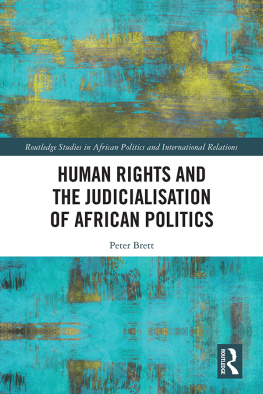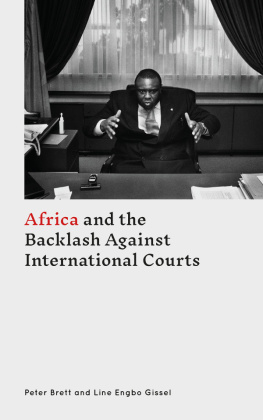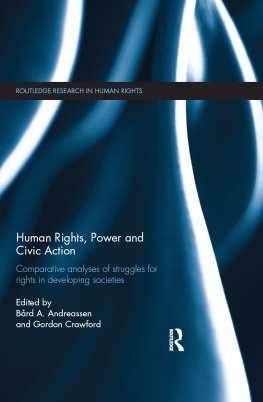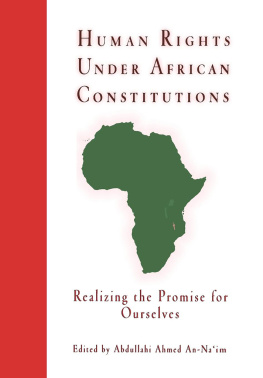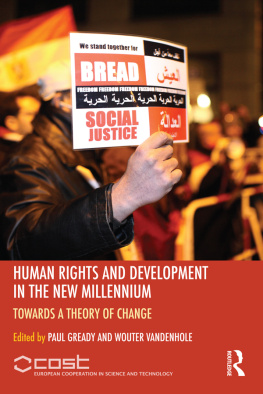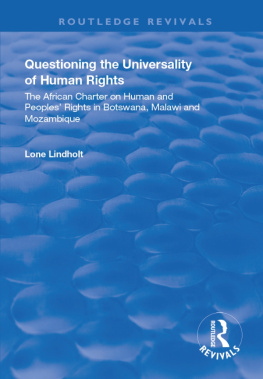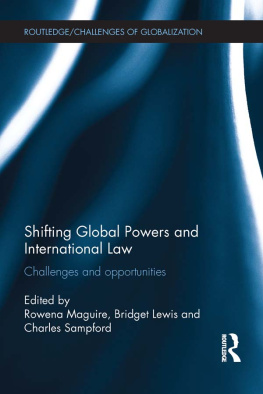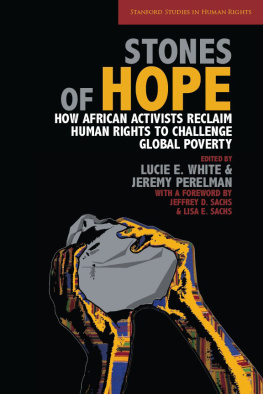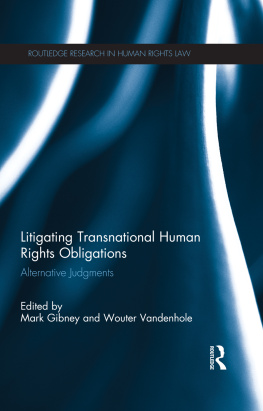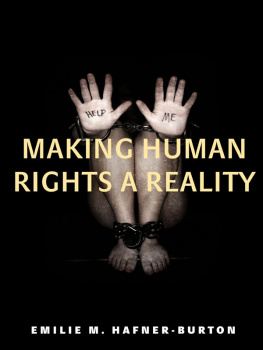Human Rights and the Judicialisation of African Politics
Human Rights and the Judicialisation of African Politics shows readers how central questions in African politics have entered courtrooms over the last three decades and provides the first transnational explanation for this development.
The book begins with three conditions that have made judicialisation possible in Africa as a whole; new corporate rights norms (including the expansion of indigenous rights), the proliferation of new avenues for legal proceedings and the development of new support structures enabling litigation. It then studies the effects of these changes based on fieldwork in three Southern African countries Zimbabwe, Namibia and Botswana. Examining three recent court cases involving international law, international courts and transnational NGOs, it looks beyond some of international relations established models to explain when and why and legal rights can be clarified.
This text will be of key interest to scholars and students of African politics and human rights, and more broadly to international relations and international law and justice.
Peter Brett is Lecturer in International Politics at Queen Mary, University of London, UK.
Routledge Studies in African Politics and International Relations
Series Editor: Daniel C. Bach, Emile Durkheim Centre for Comparative Politics and Sociology, Sciences Po Bordeaux
Real Governance and Practical Norms in Sub-Saharan Africa
The Game of the Rules
Edited by Tom de Herdt and Jean-Pierre Olivier de Sardan
African Migrants and Europe
Managing the Ultimate Frontier
Lorenzo Rinelli
Africa in Global International Relations
Emerging Approaches to Theory and Practice
Edited by Paul-Henri Bischoff, Kwesi Aning and Amitav Acharya
Regionalism in Africa
Genealogies, Institutions and Trans-State Networks
Daniel C. Bach
Chinas Aid to Africa
Does Friendship Really Matter?
Zhangxi Cheng and Ian Taylor
African Border Disorders
Addressing Transnational Extremist Organizations
Edited by Olivier J. Walther and William F.S. Miles
Political Trust and the Politics of Security Engagement
China and the European Union in Africa
Benjamin Barton
Human Rights and the Judicialisation of African Politics
Peter Brett
For more information about this series please visit: https://www.routledge.com/Routledge-Studies-in-African-Politics-and-International-Relations/book-series/RSAPIR
Human Rights and the Judicialisation of African Politics
Peter Brett
First published 2019
by Routledge
2 Park Square, Milton Park, Abingdon, Oxon OX14 4RN
and by Routledge
711 Third Avenue, New York, NY 10017
Routledge is an imprint of the Taylor & Francis Group, an informa business
2019 Peter Brett
The right of Peter Brett to be identified as author of this work has been asserted by him in accordance with sections 77 and 78 of the Copyright, Designs and Patents Act 1988.
All rights reserved. No part of this book may be reprinted or reproduced or utilised in any form or by any electronic, mechanical, or other means, now known or hereafter invented, including photocopying and recording, or in any information storage or retrieval system, without permission in writing from the publishers.
Trademark notice: Product or corporate names may be trademarks or registered trademarks, and are used only for identification and explanation without intent to infringe.
British Library Cataloguing-in-Publication Data
A catalogue record for this book is available from the British Library
Library of Congress Cataloging-in-Publication Data
Names: Brett, Peter, 1985 author.
Title: Human rights and the judicialisation of African politics / Peter Brett.
Other titles: Routledge studies on African politics and international relations.
Description: New York : Routledge, 2019. | Series: Routledge studies in African politics and international relations | Includes bibliographical references and index.
Identifiers: LCCN 2018020020
Subjects: LCSH: Political questions and judicial powerAfrica. | Judicial processAfrica. | NamibiaPolitics and government21st century. | BotswanaPolitics and government21st century. | ZimbabwePolitics and government21st century.
Classification: LCC KQC608 .B74 2019 | DDC 347.605dc23
LC record available at https://lccn.loc.gov/2018020020
ISBN: 978-1-138-28923-9 (hbk)
ISBN: 978-1-315-26729-6 (ebk)
Typeset in Times New Roman
by codeMantra
Contents
Part I
Explaining Judicialisation
Part II
Case studies
This book is based on work I began eight years ago more than enough time to accumulate numerous debts in any circumstances. Unfortunately, however, I have also been foolish enough to try and write a book that pleases both social scientists and regional specialists. This has made me especially obligated to those (Southern) Africanists who have forgiven my taste for theory. Larissa Frster and Dag Henrichsen were exceptionally helpful during my research on Namibia, whilst Reinhart Kssler generously made detailed comments on a draft of was received from Phillan Zamchiya, Donna Pankhurst and the seminar audience at the University of Bradfords John and Elnora Ferguson Centre for African Studies. Jennifer Hays and Sidsel Saugestad gave sound advice about studying the Botswanan case. Siri Gloppen went beyond the call of duty as a discussant at the European Conference on African Studies. Nat Rubner kindly agreed to share and discuss his important unpublished work. Perhaps, however, it is my interviewees who deserve the most gratitude. Almost all gave up hours of precious time to discuss these issues with (if not explain them to) a perfect stranger. Some even made comments on early draft chapters. Suffice to say that I cannot thank them enough.
Many others have provided friendship and support. David dAvray remains a mentor and an inspiration. Phil Clark helped me in numerous ways during my PhD and made me very welcome at SOAS. Julia Gallagher and David Harris continued to be friends and colleagues even after they took positions elsewhere. Over the last three years at Queen Mary Ive been shown too much kindness by too many people to single anyone out for thanks. The following, however, have provided not just companionship but also conversation on subjects relating to this book: Engin Isin, Sophie Harman, Clive Gabay, Kim Hutchings, James Eastwood, Nick Hostettler, Lee Jones, Ray Kiely and James Dunkerley. In other capacities Ive been lucky to know and work with Anselme Asseghna Somda, Sara Dezalay, Alexander Stroh, Jan Budniok, Alhassan Sulemana Anamzoya and Sanne Verheul. Research and writing with Line Engbo Gissel has been a real pleasure.
My most important intellectual debts, however, are to those who have read versions of the whole manuscript. Sharath Srinavasan and Stephen Hopgood were excellent examiners of its much earlier and more disorganised incarnation as a PhD. Calum Fisher made some excellent suggestions about how to improve the text. David Williams has done the same whilst also doing everything possible to make me feel like a valued colleague. It was his work with Tom Young that first inspired mine. Tom, meanwhile, has been a friend and supervisor who showed faith in this project from its inception. I owe him an enormous amount and will always be grateful.

